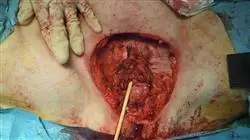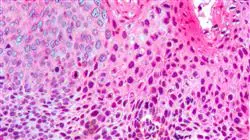University certificate
The world's largest faculty of medicine”
Introduction to the Program
New circumstances in gynecologic oncology have pushed us to develop new educational programs that meet the real needs of experienced professionals, so that they can incorporate new advances into their daily practice"

Vulvar cancer is the fifth most common genital cancer in women. In some cases, it goes unnoticed because it occurs in elderly women who are given ineffective treatments for benign vulvar pathology.
This makes a thorough understanding of the disease and the correct application of treatments the key to increased survival and recovery rates.
This Postgraduate diploma is aimed at providing up-to-date courses of action for the patient with vulvar cancer. In addition, thanks to this Postgraduate diploma, the student will be able to conceptually manage the principles of tumor biology and targeted medical treatments, as well as other issues related to the diagnosis and treatment of Vulvar Cancer in women.
This Postgraduate diploma allows you to gain knowledge of the latest advances in Vulvar Cancer, through the latest educational technology"
This Postgraduate diploma in Vulvar Cancer contains the most complete and up-to-date scientific program on the market. The most important features include:
- The examination of clinical cases, recorded with POV (Point of View) systems from different angles, presented by experts in gynecology and other disciplines The graphic, schematic, and practical contents with which they are created, provide scientific and practical information on the disciplines that are essential for professional practice
- Presentation of practical workshops on procedures and techniques
- An algorithm-based interactive learning system for decision-making in the clinical situations presented throughout the course
- Action protocols and clinical practice guidelines, which cover the most important latest developments in this specialist area
- All of this will be complemented by theoretical lessons, questions to the expert, debate forums on controversial topics, and individual reflection assignments
- Special emphasis on test-based medicine and research methodologies in oncology
- Content that is accessible from any fixed or portable device with an Internet connection
This Postgraduate diploma may be the best investment you can make in the selection of a refresher program for two reasons: in addition to updating your knowledge in Vulvar Cancer you will obtain an Postgraduate Diploma from TECH Global University"
The teaching staff includes a team of renowned gynecologists and oncologists, who bring their professional experience to this program, in addition to recognized specialists belonging to leading scientific societies.
The multimedia content developed with the latest educational technology will provide the professional with situated and contextual learning, i.e., a simulated environment that will provide an immersive program to prepare for real situations.
This program is designed around Problem-Based Learning, whereby specialists must try to solve the different professional practice situations that arise throughout the program. To do this, they will be assisted by an innovative, interactive video system created by renowned and experienced experts in the field of gynecology and oncology with extensive teaching experience.
Incorporate the latest developments in the approach to Vulvar Cancer into your daily practice and improve the prognosis of your patients"

Seize this opportunity and take the next step to get up to date on the latest developments in vulvar cancer treatments"
Why study at TECH?
TECH is the world’s largest online university. With an impressive catalog of more than 14,000 university programs available in 11 languages, it is positioned as a leader in employability, with a 99% job placement rate. In addition, it relies on an enormous faculty of more than 6,000 professors of the highest international renown.

Study at the world's largest online university and guarantee your professional success. The future starts at TECH”
The world’s best online university according to FORBES
The prestigious Forbes magazine, specialized in business and finance, has highlighted TECH as “the world's best online university” This is what they have recently stated in an article in their digital edition in which they echo the success story of this institution, “thanks to the academic offer it provides, the selection of its teaching staff, and an innovative learning method aimed at educating the professionals of the future”
A revolutionary study method, a cutting-edge faculty and a practical focus: the key to TECH's success.
The most complete study plans on the university scene
TECH offers the most complete study plans on the university scene, with syllabuses that cover fundamental concepts and, at the same time, the main scientific advances in their specific scientific areas. In addition, these programs are continuously being updated to guarantee students the academic vanguard and the most in-demand professional skills. In this way, the university's qualifications provide its graduates with a significant advantage to propel their careers to success.
TECH offers the most comprehensive and intensive study plans on the current university scene.
A world-class teaching staff
TECH's teaching staff is made up of more than 6,000 professors with the highest international recognition. Professors, researchers and top executives of multinational companies, including Isaiah Covington, performance coach of the Boston Celtics; Magda Romanska, principal investigator at Harvard MetaLAB; Ignacio Wistumba, chairman of the department of translational molecular pathology at MD Anderson Cancer Center; and D.W. Pine, creative director of TIME magazine, among others.
Internationally renowned experts, specialized in different branches of Health, Technology, Communication and Business, form part of the TECH faculty.
A unique learning method
TECH is the first university to use Relearning in all its programs. It is the best online learning methodology, accredited with international teaching quality certifications, provided by prestigious educational agencies. In addition, this disruptive educational model is complemented with the “Case Method”, thereby setting up a unique online teaching strategy. Innovative teaching resources are also implemented, including detailed videos, infographics and interactive summaries.
TECH combines Relearning and the Case Method in all its university programs to guarantee excellent theoretical and practical learning, studying whenever and wherever you want.
The world's largest online university
TECH is the world’s largest online university. We are the largest educational institution, with the best and widest online educational catalog, one hundred percent online and covering the vast majority of areas of knowledge. We offer a large selection of our own degrees and accredited online undergraduate and postgraduate degrees. In total, more than 14,000 university degrees, in eleven different languages, make us the largest educational largest in the world.
TECH has the world's most extensive catalog of academic and official programs, available in more than 11 languages.
Google Premier Partner
The American technology giant has awarded TECH the Google Google Premier Partner badge. This award, which is only available to 3% of the world's companies, highlights the efficient, flexible and tailored experience that this university provides to students. The recognition as a Google Premier Partner not only accredits the maximum rigor, performance and investment in TECH's digital infrastructures, but also places this university as one of the world's leading technology companies.
Google has positioned TECH in the top 3% of the world's most important technology companies by awarding it its Google Premier Partner badge.
The official online university of the NBA
TECH is the official online university of the NBA. Thanks to our agreement with the biggest league in basketball, we offer our students exclusive university programs, as well as a wide variety of educational resources focused on the business of the league and other areas of the sports industry. Each program is made up of a uniquely designed syllabus and features exceptional guest hosts: professionals with a distinguished sports background who will offer their expertise on the most relevant topics.
TECH has been selected by the NBA, the world's top basketball league, as its official online university.
The top-rated university by its students
Students have positioned TECH as the world's top-rated university on the main review websites, with a highest rating of 4.9 out of 5, obtained from more than 1,000 reviews. These results consolidate TECH as the benchmark university institution at an international level, reflecting the excellence and positive impact of its educational model.” reflecting the excellence and positive impact of its educational model.”
TECH is the world’s top-rated university by its students.
Leaders in employability
TECH has managed to become the leading university in employability. 99% of its students obtain jobs in the academic field they have studied, within one year of completing any of the university's programs. A similar number achieve immediate career enhancement. All this thanks to a study methodology that bases its effectiveness on the acquisition of practical skills, which are absolutely necessary for professional development.
99% of TECH graduates find a job within a year of completing their studies.
Postgraduate Diploma in Vulvar Cancer
Among the many pathologies that women suffer from is vulvar cancer, caused by the disproportionate growth of cells (mutations). Although the disease can occur at any stage of life, it develops mainly in older women. This condition has become a public health problem, as it is the fourth most common gynecological cancer among women, according to the WHO (World Health Organization). To treat this disease it is necessary to have specialists in the field of gynecologic oncology, who must include in their training the latest medical developments. Motivated to meet this need, TECH has developed a Postgraduate Certificate course in Vulvar Cancer, focused on the correct application of chemotherapy treatments. By taking the Postgraduate Certificate, you will learn the most innovative aspects related to this field and integrate them into your daily practice. During the six months of the program, you will learn about the biological basis of cancer, the molecular characteristics of carcinogenesis, its development and metastasis. In addition, you will study palliative care and nutrition, followed by fertility preservation techniques (ovarian tissue) and their oncological implications in young patients.
Get trained in Vulvar Cancer
At TECH we offer exceptional academic content, from practical workshop presentations on procedures and techniques related to this pathology, to clinical guides that include protocols and the most important developments in the area. Thanks to our methodology complemented with multimedia material, you will specialize in the early detection of the disease and the integral preservation of the patient. Through the syllabus, you will delve into the new medical and surgical therapies in the metastatic stage of the disease and the mechanisms of action in case the user presents resistance. You will also learn the basics of tumor biology, aspects related to the diagnosis of vulvar cancer, the use of chemotherapy in gynecologic oncology, its adverse effects and possible complications that may arise. After completing these thematic axes, you will be able to incorporate the latest developments in your daily practice.







